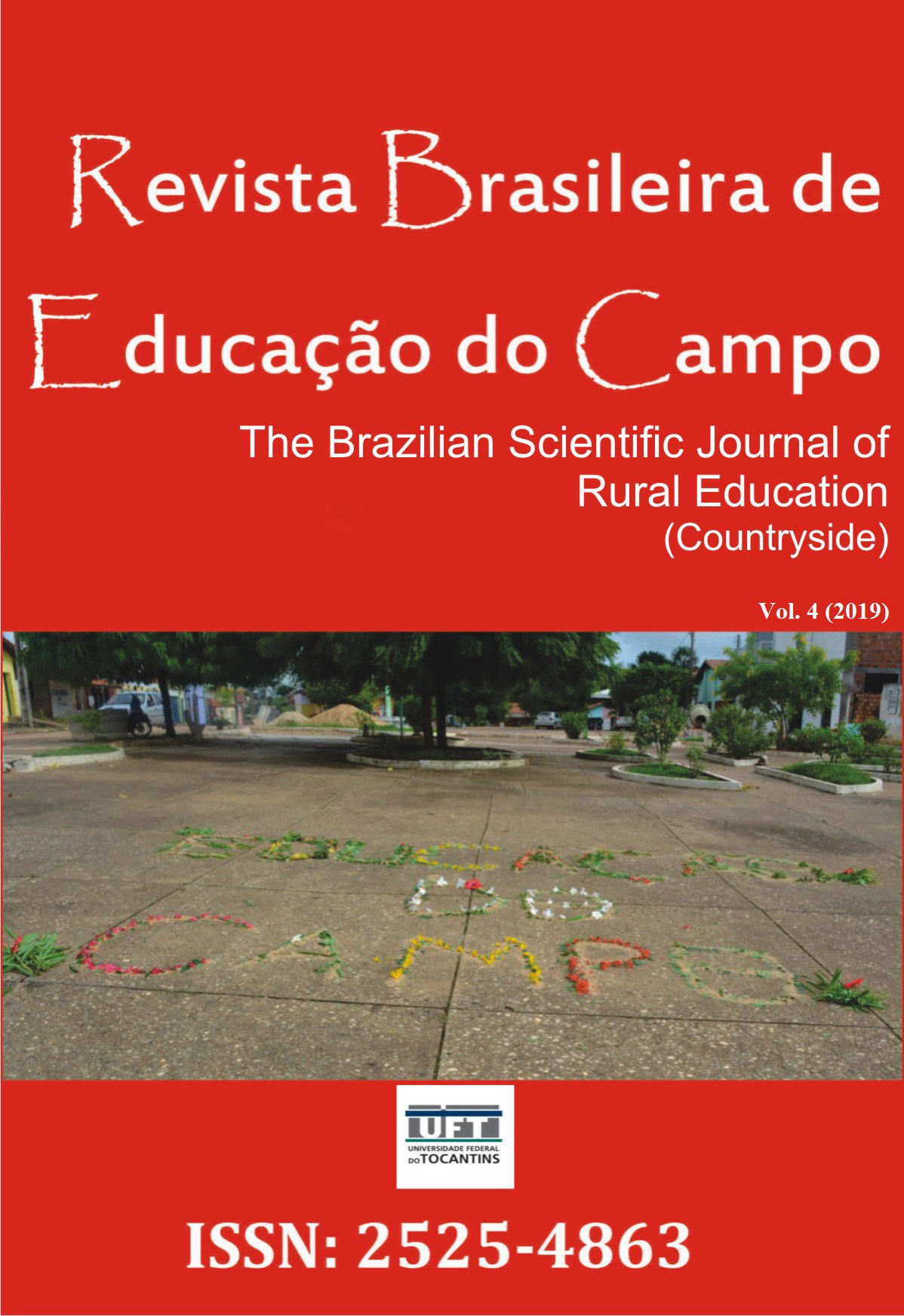Alternation And its 50 Years: A Training Possibility of Countryside Educations
DOI :
https://doi.org/10.20873/uft.rbec.e7292Mots-clés :
Alternate training, Countryside education, Integral training and Sustainable development.Résumé
This article presents the partial results of a research about the main theoretical and practical aspects of the alternation and its formative possibility in the education of the countryside. It is based on the reflections of the Pedagogy of Alternation and Field Education Working Group discussed at the International Seminar held in October 2018. On the occasion, the 50th anniversary of the Espírito Santo Promotional Education Movement (MEPES), the pioneering organization in Latin America, was celebrated, with the discussion on networks of emancipatory cooperation in integral formation and sustainable development. It makes theoretical interlocutions with Gimonet (2002, 2007); Garcia-Marirrodriga (2002); Puig-Calvó (2002); Caliari (2002); Molina (2010) and Antunes-Rocha (2010). Methodologically, the study made use of a focus group (Gatti, 2012), showing results regarding the importance of alternation in the training of peasants, the relevance of Training Centers for Alternation (CEFFAs) to strengthen family farming and the organicity of the assumptions of training in alternation with the Countryside Education Movement, especially regarding the relationship with the demands for integral formation and sustainability.
Téléchargements
Références
Antunes-Rocha, M. I., Pernambuco, M. M. C., Paiva, I. A., & Rego, M. C. F. D. (2010). Formação e Trabalho Docente na Escola do Campo: Protagonismo e Identidades em Construção. In Molina, M. C. (Org.). Educação do Campo e Pesquisa II. Questões para Reflexão (pp. 65-73). Brasília, DF: MDA/MEC.
Begnami, J. B. (2006). Pedagogia da alternância como sistema educativo. Revista da Formação por Alternância. 1(2), 39-41.
Caldart, R. S. (2009). Educação do Campo: notas para uma análise de percurso. Trab. Educ. Saúde [online], 7(1), 35-64. Doi: http://dx.doi.org/10.1590/S1981-77462009000100003
Caliari, R. O. (2002). Pedagogia da Alternância e Desenvolvimento Local. Lavras, MG: UFLA.
Demo, P. (2002). Educação e conhecimento. Rio de Janeiro, Petrópolis, RJ: Vozes.
Fernandes, B. M. (2008). Educação do campo e território camponês. In Santos, C. A. (Org.). Por uma educação do campo: campo, políticas e educação (pp. 39-66). Brasília, DF: NEADA/INCRA.
Freire, P. (1979). Conscientização. São Paulo, SP: Cortez Editora.
Freire, P. (2002). Extensão ou Comunicação? (20. ed). São Paulo, SP: Paz e Terra.
Freire, P. (2006). Pedagogia da Autonomia. Saberes necessários à prática educativa. São Paulo, SP: Paz e Terra.
Frigotto, G. (2012). Educação omnilateral. In Caldart, R. S., Pereira, I. B., Alentejano, P., & Frigotto, G. (Orgs.). Dicionário da Educação do Campo (pp. 265-272). Rio de Janeiro, RJ: Expressão Popular.
Garcia-Marirrodriga, R. (2002). La formación por alternancia en el medio rural: contexto e influencia de las MFR sobre el desarrollo local de Europa y los PVD. Modelo de planificación y aplicación al caso de Colombia (Tesis Doctoral). Universidad Politécnica de Madrid, Madri. Recuperado de http://oa.upm.es/640/1/02200217.pdf
Gatti, B. A. (2012). Grupo focal na pesquisa em ciências sociais e humanas. Brasília, DF: Liber Livro.
Gerke de Jesus, J. (2011). Formação dos Professores na Pedagogia da Alternância: Saberes e fazeres do campo. Vitória, ES: GM.
Gimonet, J. C. (2007). Praticar e compreender a pedagogia da alternância dos CEFFAS. Petropolis, RJ: Vozes.
Gimonet, J. C. (2002). Adolescência e Alternância. In Anais do II Seminário Internacional da Pedagogia da Alternância. Formação em Alternância e Desenvolvimento Sustentável (pp. 118-125). Brasília, DF.
Gramsci, A. (2001). Cadernos do cárcere: os intelectuais, o princípio educativo, o jornalismo, 13(2). Rio de Janeiro, RJ: Civilização Brasileira.
Molina, M. C., & Jesus, S. M. S. A. (Orgs.). (2004). Contribuições para a construção de um projeto de educação do campo. Brasília, DF: Articulação Nacional Por uma educação do Campo. Recuperado de
Molina, M. C. (2010). Reflexões sobre o significado do protagonismo dos Movimentos Sociais na construção de Políticas Públicas de Educação do Campo. In Molina, M. (Org.). Educação do Campo e Pesquisa II. Questões para Reflexão (pp. 137-149). Brasília: MDA/MEC. Recuperado de
http://www.epsjv.fiocruz.br/upload/d/Vendramini.pdf
Puig-Calvó. P. (2002). Formação Pessoal e Desenvolvimento Local. In Anais do II Seminário Internacional da Pedagogia da Alternância. Formação em Alternância e Desenvolvimento Sustentável (pp. 126-146). Brasília, DF.
Sá, L. M., & Molina, M. C. (2010). Políticas de Educação Superior no Campo. In Molina, M. (Org.) Educação do Campo e Pesquisa II. Questões para Reflexão (pp. 74-83). Brasília: MDA/MEC. Recuperado de http://www.epsjv.fiocruz.br/upload/d/Vendramini.pdf
Schneider, S. Ferreira, B., & Alves, F. (Orgs.). (2014). Aspectos multidimensionais da agricultura brasileira: diferentes visões do censo agropecuário brasileiro 2006. Brasília: IPEA. Recuperado de http://www.ipea.gov.br/portal/index.php?option=com_content&view=article&id=21595
Silva, L. H. (2010). Concepções e Práticas de alternância em Educação do Campo. In Revista FCT. UNESP.BR, 17(18), 180-191.
Silva, M. S. (2007). A formação Integral do ser humano: referência e desafio da Educação do Campo. Revista da Formação por Alternância, 1(5), 45-61.
Zamberlan, S. (1996). Pedagogia da alternância: escola da família agrícola. MEPES – Movimento de Educação Promocional do Espírito Santo. Anchieta: Mansur Ltda.
Téléchargements
Publié-e
Comment citer
Numéro
Rubrique
Licence
Proposal for Copyright Notice Creative Commons
1. Policy Proposal to Open Access Journals
Authors who publish with this journal agree to the following terms:
A. Authors retain copyright and grant the journal right of first publication with the work simultaneously licensed under the Creative Commons Attribution License that allows sharing the work with recognition of its initial publication in this journal.
B. Authors are able to take on additional contracts separately, non-exclusive distribution of the version of the paper published in this journal (ex .: publish in institutional repository or as a book), with an acknowledgment of its initial publication in this journal.
C. Authors are permitted and encouraged to post their work online (eg .: in institutional repositories or on their website) at any point before or during the editorial process, as it can lead to productive exchanges, as well as increase the impact and the citation of published work (See the Effect of Open Access).














